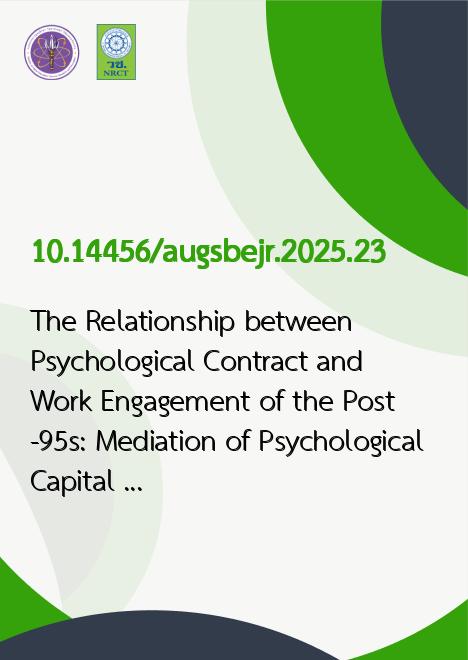
|
The Relationship between Psychological Contract and Work Engagement of the Post-95s: Mediation of Psychological Capital and Moderation of Organizational Commitment |
|---|---|
| รหัสดีโอไอ | |
| Creator | Shumin Wang |
| Title | The Relationship between Psychological Contract and Work Engagement of the Post-95s: Mediation of Psychological Capital and Moderation of Organizational Commitment |
| Publisher | Assumption University Press |
| Publication Year | 2568 |
| Journal Title | AU-GSB e-Journal |
| Journal Vol. | 18 |
| Journal No. | 1 |
| Page no. | 237-246 |
| Keyword | Psychological Contract, Work Engagement, Psychological Capital, Organizational Commitment |
| URL Website | http://www.assumptionjournal.au.edu/index.php/AU-GSB/article/view/7394 |
| Website title | AU-GSB e-Journal |
| ISSN | 1906-3296 |
| Abstract | Purpose: This study investigates the relationship between psychological contract and work engagement among post-95 employees, emphasizing the mediating role of psychological capital and the moderating role of organizational commitment. It aims to provide theoretical insights and practical suggestions for improving employee engagement and organizational performance by focusing on this unique generational cohort. Research design, data and methodology: The research employed a structured survey distributed to 10 IT companies in Shanghai, targeting employees born between 1995 and 1999. A total of 590 valid responses were analyzed using structural equation modeling (SEM) to explore direct, mediating, and moderating relationships. Results: The findings reveal that psychological contract positively influences work engagement and psychological capital, while psychological capital positively impacts work engagement. Furthermore, psychological capital mediates the relationship between psychological contract and work engagement. Organizational commitment moderates the relationship, significantly enhancing the positive effects of psychological contract on work engagement. Conclusions: The study highlights the importance of psychological contract fulfillment and psychological capital development in enhancing post-95 employees' work engagement. Organizational commitment strengthens these effects, underscoring the need for enterprises to adopt flexible and employee-centric management strategies. These findings offer actionable insights for human resource practices and contribute to the theoretical understanding of generational dynamics in the workplace. |
